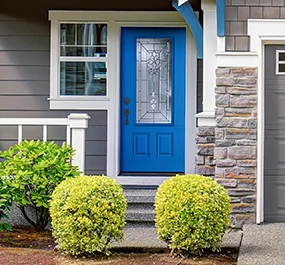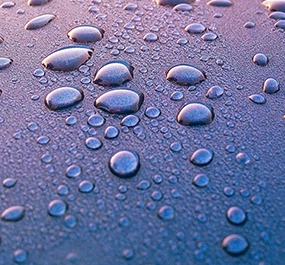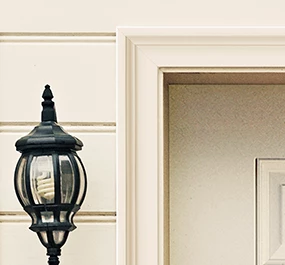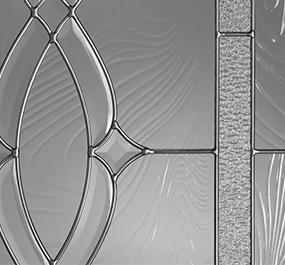No one likes a pesky draft in the winter or dealing with insects or other pests in the summer. Oftentimes, drafts and pests enter the home the same way that people do—through the doorway. So how can homeowners stop this?
Exterior door sweeps are one of the most effective solutions to these issues. Whether you’re adding a door sweep or upgrading an existing one, there are important factors to consider when choosing an exterior door sweep. Let’s take a look at some of the key elements to factor in for your new door sweep.
What is an Exterior Door Sweep
An exterior door sweep is a device that helps to seal the space between the bottom of a door and the threshold. Door sweeps are installed on the outside face of the door, preventing dust, water, and other elements from building up beneath the door and entering the home.
Exterior door sweeps are typically made of vinyl, but they can also be made of brush material. They come in a variety of widths to fit standard door sizes.
Types of Door Sweeps
There are a variety of types of exterior door sweeps, each with their own strengths and weaknesses. Let’s take a look at some of the most common.
Peel & Stick Sweep
Peel & stick door sweeps are the easiest to install being that they are applied with an adhesive strip. This means there’s no need to drill into the door, making it a great temporary solution—such as for those renting. That said, peel & stick door sweeps typically aren’t the best permanent solution being that they aren’t as durable as those that are installed with fasteners.
Mounted Strip Sweep
A mounted strip is similar in design to a peel & stick door sweep, but it’s mounted to the door, typically using screws. This type of exterior door sweep generally utilizes a metal mount—oftentimes aluminum—that is screwed into the door. The vinyl strip is attached to the mount, hanging beneath the door when the sweep is mounted.
This type of door sweep provides a great balance of easy installation and performance. It’s more durable than a peel & stick being that it’s screwed into the door, and it’s easier to install than other types of door sweeps.
Brush/Bristle Sweep
Brush or bristle sweeps are generally the same as mounted strips in design—the only difference being the sweep material. Whereas most strip-style sweeps use vinyl, brush sweeps utilize bristles that resemble those of an outdoor broom.
Brush sweeps typically aren’t as effective as vinyl strip sweeps, especially when it comes to keeping out water. However, they will generally last longer than vinyl.
Automatic Sweep
Automatic sweeps typically require professional installation, but they offer top performance in exchange. Automatic door sweeps rise when the door is open and form a seal when the door is closed. This makes them a great choice for in-swing exterior doors, as the sweep will not cause the door to stick on carpet, and it makes the sweep invisible when the door is open.
Benefits of an Exterior Door Sweep
Exterior door sweep performance may vary depending on the type of sweep you choose—however, each is designed with the same benefits in mind. Let’s take a look at some of the core benefits of adding an exterior door sweep and how each type stacks up.
Energy Efficiency
Arguable the core function of a door sweep is to help minimize temperature exchange between the home and outside. For example, cold drafts in the winter can mean two things: a less comfortable home and higher heating bills. By preventing drafts from coming in, the home is kept warmer and there’s no wasted energy.
Exterior door sweeps that seal the door directly from the bottom are best for improving overall draft prevention and energy efficiency. Automatic door sweeps are a great choice for this. For door sweeps mounted on the exterior of the door, vinyl typically performs better than bristles.
Keeping Out Dirt, Dust, and Water
In addition to keeping out drafts, door sweeps also keep out dirt and other elements. By sweeping away dirt, dust, and water from the entryway, there’s less chance of these things making it inside the home.
All types of door sweeps can help with this, but bristle sweeps generally won’t perform as well for keeping moisture out.
Soundproofing
The best soundproof doors are only as good as their seal. Sealing the bottom of a door with a door sweep will also help to keep unwanted noise from entering the home. This could be anything from loud traffic, sirens, or nearby conversations.
The better the seal, the better the soundproofing, meaning under-the-door sweeps will perform best. However, all sweeps should improve the overall soundproof performance of the door.
Pest Control
Gaps at the bottom of an exterior door are like invitations to tiny, unwanted visitors. Door sweeps can help prevent insects, spiders, or other small pests from making it into the home. Vinyl options are generally better for this than bristle options.
Seal Your Entryway with Plastpro
Adding an exterior door sweep is a great way to seal your entryway, improving overall energy efficiency and blocking unwanted pests or sound from entering. The type of door sweep best for you will depend on your specific needs and budget.
That being said, if you’re looking to improve the performance of your entryway, the best place to start is with the door itself. Plastpro’s lineup of fiberglass exterior doors are made to stand against the elements and improve energy efficiency. With a high-density polyurethane core and durable hard shell, Plastpro doors are specifically designed to provide maximum durability, efficiency, and security.
To upgrade your entryway with a new fiberglass door, visit our Where to Buy page to find a dealer near you.



